LCL vs FCL: qual è l'opzione di trasporto merci migliore per la tua attività?
Cosa significano FCL e LCL in termini di spedizione? FCL sta perCarico completo container" e LCL sta perCarico inferiore a container completo (LCL)". Vengono utilizzati nel trasporto merci per descrivere lo stato del container. Scopri di seguito i pro e i contro di ciascun metodo.
.jpeg)
Vuoi spedire all'estero utilizzando una combinazione di trasporto marittimo e ferroviario? Dovrai prendere alcune decisioni importanti. Una decisione fondamentale è se optare per la spedizione Carico inferiore a container completo (LCL) o Carico completo container (FCL).
Il modo in cui trasporti le tue merci a livello internazionale avrà un impatto significativo sui costi della tua attività, sulle tempistiche di consegna e, in ultima analisi, sull'esperienza dei tuoi clienti finali in caso di esaurimento delle scorte. La scelta dipende dalle tue specifiche esigenze di spedizione. Facciamo un confronto.
In questo post scoprirai:
- Che cos'è l'LCL?
- Vantaggi di LCL
- Che cos'è l'FCL?
- Vantaggi di FCL
- Confronto tra LCL e FCL Tabella, Tabelle
- FCL vs. LCL: qual è la soluzione migliore per la tua azienda?
- Lavorare con un 3PL che comprende le tue esigenze di trasporto
Cosa significa LCL nel trasporto merci?
Cosa significa LCL nelle spedizioni? LCL è una terminologia di spedizione abbreviata. Sta per Carico inferiore a container completo (LCL). Le spedizioni LCL sono solitamente consolidate da carichi provenienti da più mittenti in un unico container.
Le merci di diversi spedizionieri che condividono lo stesso percorso per il trasporto principale vengono consegnate a un magazzino vicino al porto e consolidate in container. Nel porto di destinazione, la merce viene nuovamente separata e inviata alla destinazione finale tramite camion o ferrovia.
Se trasporti le merci in LCL, il tuo carico condividerà lo spazio del container con altre aziende.
Gli spedizionieri e i consolidatori svolgono un ruolo fondamentale nella gestione della logistica delle spedizioni LCL, aiutandoti a consolidare le tue spedizioni più piccole in un container prima di spedirle a destinazione.
Le spedizioni LCL sono utili per le piccole aziende di e-commerce o per i privati se il volume delle spedizioni non riempie un intero container.
Vantaggi di LCL
Le spedizioni LCL presentano molti vantaggi, tra cui:
- Efficienza dei costi: Il risparmio sui costi è uno dei principali vantaggi delle spedizioni LCL. Paghi solo per lo spazio occupato dalle tue merci all'interno del container, il che consente una spedizione più economica, soprattutto per le spedizioni più piccole. Condividere un container con altri spedizionieri aiuta a distribuire il costo complessivo della spedizione, rendendola un'opzione conveniente.
- Flessibilità: Le spedizioni LCL ti offrono una flessibilità totale sulla quantità di merce da spedire. Non è necessario riempire un intero container, il che significa che puoi spedire volumi più piccoli senza preoccuparti di un eccessivo accumulo di scorte. La flessibilità delle spedizioni LCL è ideale se la tua azienda di e-commerce ha spedizioni di dimensioni diverse o esigenze stagionali.
- Riduzione dei costi di gestione dell'inventario: ti offre la possibilità di spedire quantità più piccole con maggiore frequenza, riducendo così la necessità di tenere un inventario eccessivo. Questo ti aiuta a ottimizzare la gestione dell'inventario e a mantenere bassi i costi di magazzino.
- Accessibile alle PMI: le piccole imprese sono meglio equipaggiate per competere su scala globale con le spedizioni LCL. Permette di accedere ai mercati internazionali senza la necessità di spedire volumi enormi. La tua attività di e-commerce può beneficiare di costi di spedizione più bassi e accedere a nuovi mercati in modo efficiente.
- Sostenibilità ambientale: Condividere lo spazio dei container con altri spedizionieri aiuta a ottimizzare l'uso dei container. In questo modo si riducono le emissioni di carbonio associate al trasporto internazionale delle merci. Per le spedizioni più piccole, LCL è un'opzione di spedizione più ecologica rispetto a FCL.
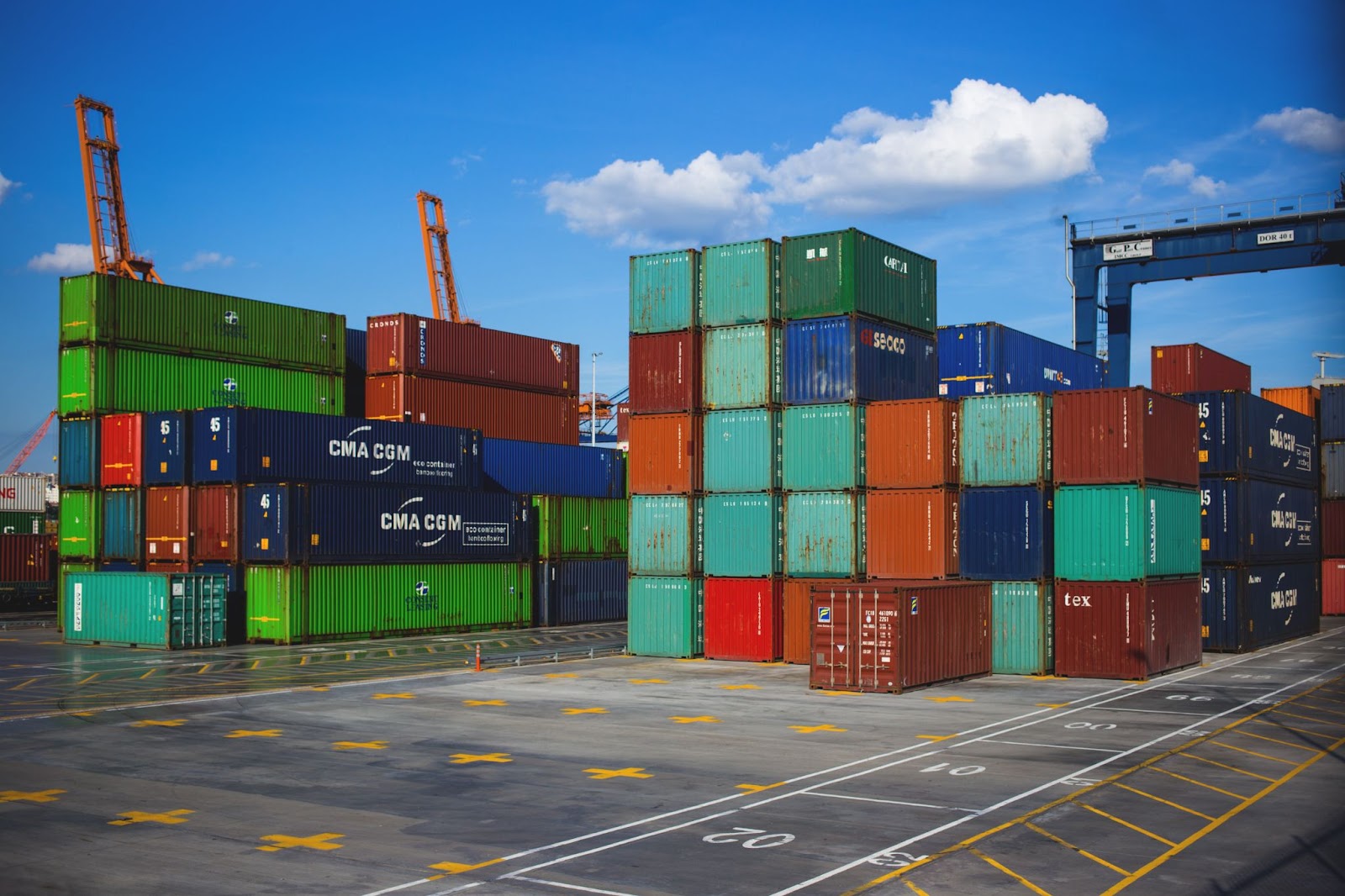
Cosa significa FCL?
FCL è l'acronimo di Carico completo container. Tuttavia, non significa che un container debba essere pieno, ma solo che trasporta esclusivamente la tua merce. A differenza dell'LCL, che trasporta merci da più mittenti, l'FCL ti dà l'uso esclusivo di un container. È ideale per spedire grandi volumi che riempiono un intero container.
Vantaggi di FCL
I vantaggi dell'FCL includono:
- Uso esclusivo del container: Quando usi le spedizioni FCL, hai il controllo completo del container. Questo ti permette di massimizzare l'uso dello spazio e di caricare le merci in modo più efficiente. Inoltre, riduce il rischio di perdite e danni al carico.
- Tempi di transito più rapidi: Mentre le spedizioni LCL richiedono il consolidamento e il deconsolidamento delle merci e comportano il prelievo e la consegna in vari punti, le FCL sono molto meno complesse. Con l'FCL, i container possono essere caricati e scaricati nei porti più rapidamente e il fatto di ridurre al minimo i punti di prelievo e consegna significa tempi di transito più rapidi.
- Manipolazione ridotta e rischio minore: Le spedizioni FCL prevedono pochissimi processi di movimentazione rispetto alle LCL, il che riduce il rischio di danni e perdite. Una volta nel container, le tue merci rimangono intatte per tutto il viaggio, riducendo così il rischio di manipolazioni errate.
- Privacy e sicurezza: Scegliendo la spedizione FCL, otterrai una maggiore privacy e sicurezza. I container vengono sigillati all'origine e non vengono aperti fino alla destinazione finale. Questo serve a migliorare la sicurezza e la riservatezza del tuo carico durante il trasporto.
- Spedizione dedicata: Le spedizioni FCL sono ideali per mantenere una catena di approvvigionamento coerente perché ti permettono di spedire un grande volume di merci in un unico viaggio. Se hai un processo di produzione ad alto volume o spedizioni regolari su larga scala, l'FCL è vantaggioso per le tue specifiche esigenze di spedizione.
Inoltre, se devi spedire un grosso volume di merce, il trasporto FCL è molto conveniente e il prezzo viene calcolato per container. In questo modo è più facile fare un bilancio. Il prezzo di una spedizione LCL viene calcolato in base al volume effettivo o allo spazio che la tua spedizione occupa in un container condiviso, rendendo il costo più complicato da calcolare.
Spedizione LCL vs spedizione FCL
Per darti una panoramica chiara delle differenze tra il trasporto merci FCL e LCL, abbiamo compilato una Tabella, Tabelle qui sotto.
Confronto LCL vs FCL Tabella, Tabelle
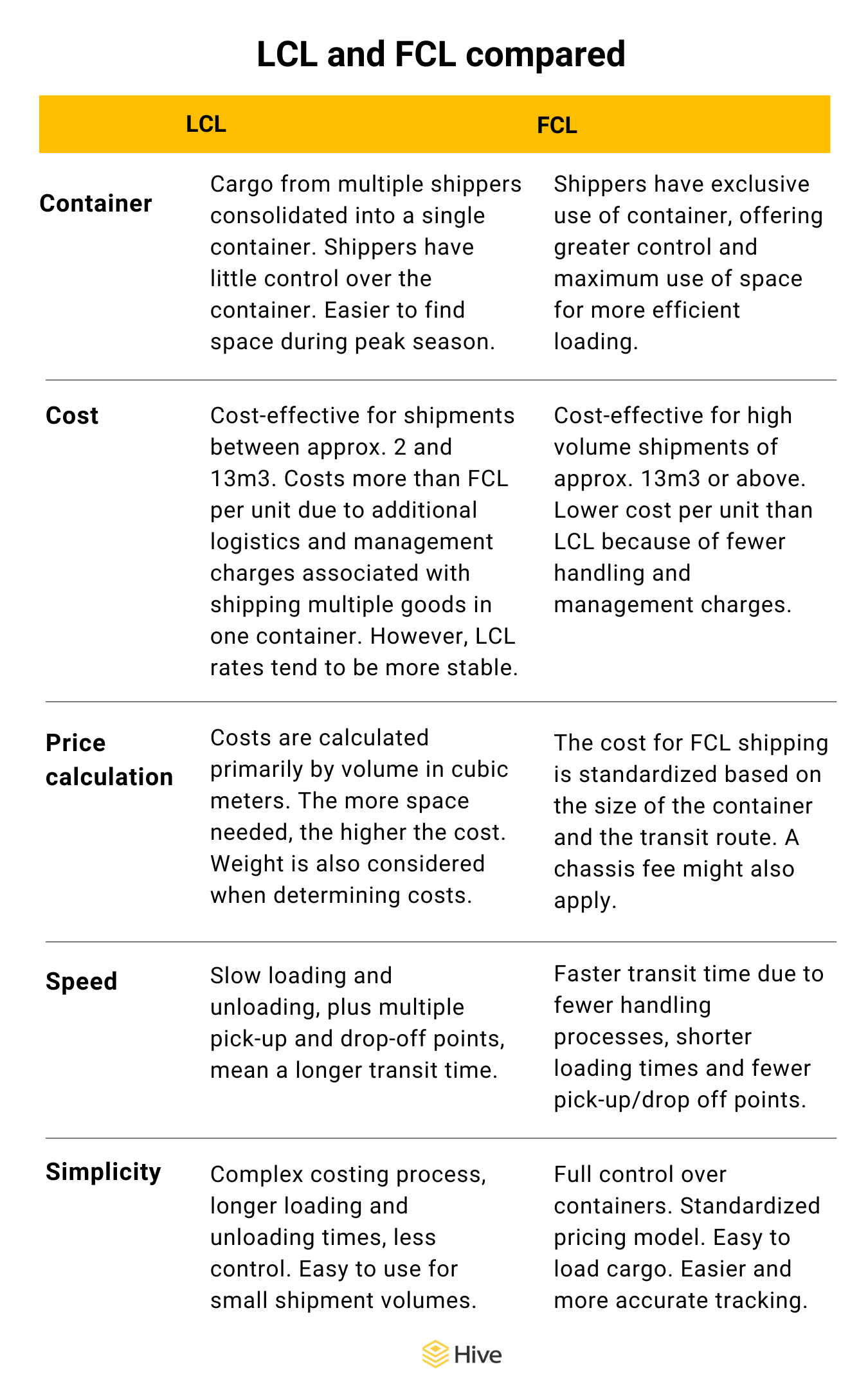
FCL vs. LCL: qual è la soluzione migliore per la tua azienda?
La scelta tra FCL e LCL dipende da una serie di fattori, tra cui:
- Le dimensioni e il peso della spedizione
- Il tuo budget
- La tua linea temporale
- Il tipo di prodotti che stai spedendo
Quando usare LCL
Come regola generale, la LCL è la soluzione migliore se devi spedire piccoli volumi con un peso totale ridotto. Dal punto di vista dei costi, la spedizione LCL è più conveniente solo se i carichi sono inferiori a 15m3. Il costo totale potrebbe essere più alto se le spedizioni superano questa quantità e a seconda del percorso di transito. Inoltre, le tasse locali tendono ad essere più alte dei costi FCL.
Se il tuo criterio è quello di effettuare spedizioni più piccole e di contenere i costi, la spedizione LCL rappresenta l'opzione migliore. I tempi di spedizione LCL dipendono dal mercato. Se la domanda è alta e la capacità è bassa, di solito è più veloce infilare qualche metro cubo in una LCL perché alcuni consolidatori avranno un po' di spazio.
Questo può causare notevoli ritardi perché i tempi di carico/scarico sono imprevedibili e fuori dal tuo controllo. Inoltre, quando un container arriva al porto o quando il carico viene scaricato, tracciare la tua merce è quasi impossibile. Inoltre, qualsiasi tracciamento potrebbe non essere accurato. In questo caso, l'intervento di uno spedizioniere può essere d'aiuto perché puoi ottenere maggiori informazioni sullo stato delle tue spedizioni.
Poi c'è il rischio per le tue merci. La spedizione LCL comporta una maggiore probabilità di danni e perdite. Perché? Spesso non hai la possibilità di scegliere dove il tuo carico viene caricato nel container. Se la tua merce è posizionata male, il rischio di un potenziale movimento all'interno del container potrebbe causare danni.
Anche la sicurezza è minore. Con più punti di movimentazione ed eventi di apertura delle porte durante il transito, le probabilità di smarrimento del carico o di furto aumentano.
In compenso, nei periodi di alta congestione dei container, come ad esempio l'alta stagione delle spedizioni, che va da agosto a ottobre, potrebbe essere più facile prenotare una spedizione LCL piuttosto che una FCL.
In genere, le spedizioni LCL richiedono una maggiore coordinazione e gestione da parte tua perché ci sono molti punti di contatto. Inoltre, i rischi associati al trasporto LCL sono maggiori e potrebbero comportare perdite finanziarie e ritardi.
In generale, la spedizione LCL è la soluzione giusta per la tua azienda se cerchi un modo economico, conveniente e rispettoso dell'ambiente per trasportare piccole spedizioni. Le spedizioni LCL tendono ad avere un trattamento preferenziale da parte dei vettori e, grazie alle partenze regolari e alle reti di instradamento, offre una soluzione flessibile e affidabile per spostare le merci a livello internazionale.
Quando utilizzare FCL
La spedizione FCL è probabilmente un processo molto meno complesso rispetto alla spedizione LCL, soprattutto perché ci sono meno punti di movimentazione, ottieni l'uso esclusivo del container e hai un maggiore controllo. Inoltre, il prezzo standardizzato Modello, Modelli rende più facile la gestione del budget.
Se i criteri di spedizione sono la velocità, il controllo, la sicurezza e la visibilità sulle spedizioni più grandi, allora l'FCL è la soluzione migliore per le esigenze della tua azienda.
Tuttavia, il FCL non è privo di sfide. Se non riempi un container, il FCL ti costerà di più.
Inoltre, non è adatto per i pacchi più piccoli, il che significa che se hai un volume di merce basso, non sarà servito da FCL. Questo lo rende praticamente inaccessibile per le piccole imprese.
Detto questo, se sei in grado di riempire completamente un container, l'FCL sarà il modo più economico, per metro cubo, di trasportare le tue merci via mare. La capacità di riempire un container significa che la tua azienda beneficia di economie di scala. Riempire o quasi un container ti permette di trasportare più prodotti utilizzando meno container.
Se trasporti molte merci di alto valore o volatili, il trasporto FCL riduce le possibilità che il carico venga danneggiato, rubato o perso. I container viaggiano su una rotta diretta con un unico destinatario, il che offre maggiori garanzie che il tuo carico arrivi sano e salvo. Questo non può essere garantito con l'LCL.
Nel complesso, FCL è il Metodo di spedizione, Metodi di spedizione giusto per la tua azienda se:
- Vuoi pagare una tariffa forfettaria per un intero container
- La merce deve essere spostata con urgenza o in tempi stretti
- Sicurezza, protezione e privacy sono importanti
Conosci la tua attività meglio di chiunque altro. La scelta tra LCL e FCL dipende da cosa si adatta meglio alle esigenze della tua azienda in questo momento. Potresti iniziare con LCL e passare a FCL quando il budget e i volumi lo permetteranno. Non esiste un approccio unico che vada bene per tutti.
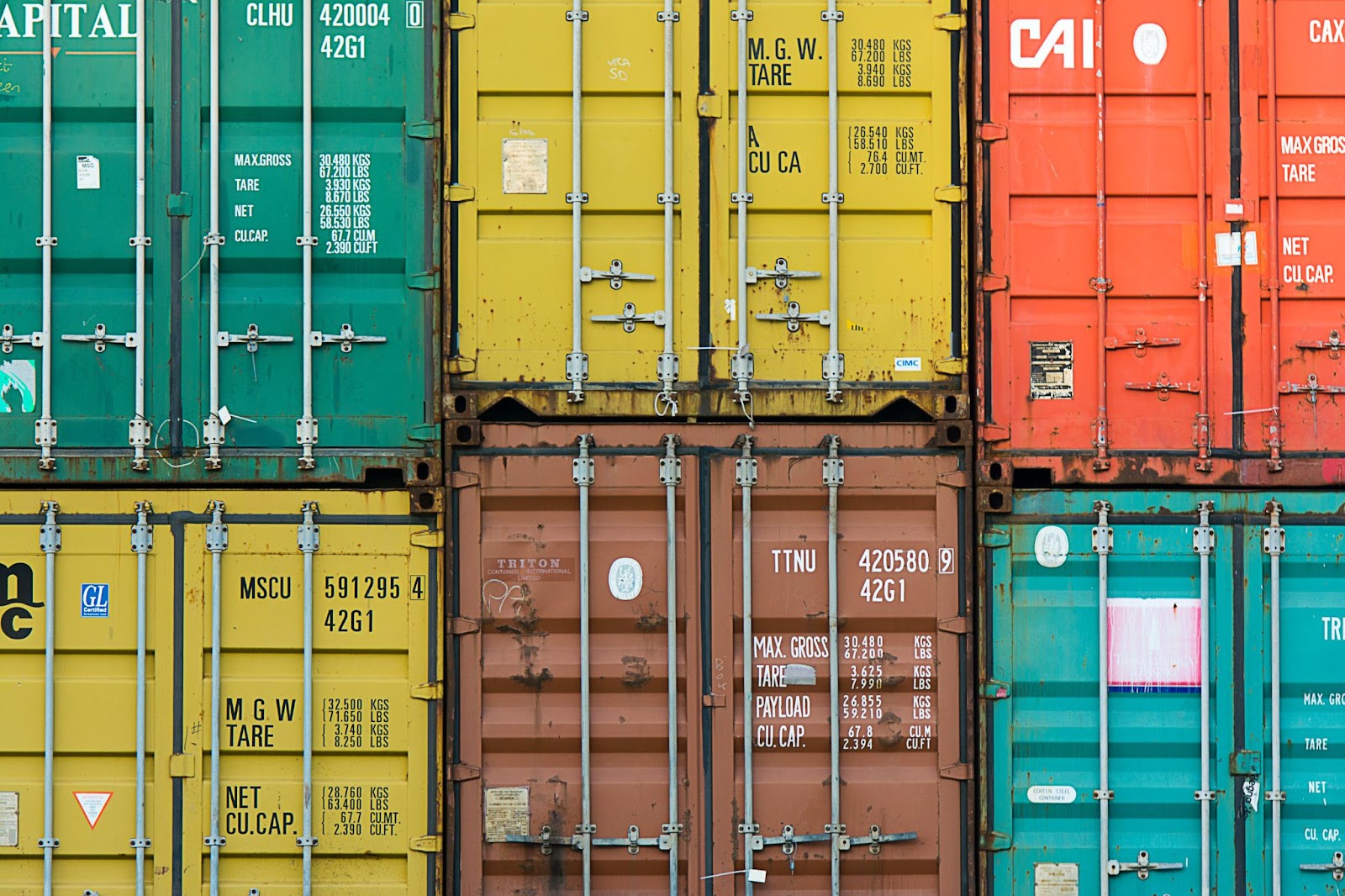
Collabora con un 3PL che può organizzare la spedizione delle merci per te
Per risparmiare tempo nella ricerca e nella pianificazione della scelta tra LCL e FCL, considera la possibilità di collaborare con un'azienda 3PL che comprenda le tue esigenze di trasporto.
Ci sono molti vantaggi nel lavorare con un partner 3PL, il più importante dei quali è il supporto da parte di specialisti delle spedizioni che ci sono già passati. Questo ti dà la certezza che le tue esigenze di spedizione sono in mani sicure.
Prendiamo ad esempio la collaborazione con Hive. Ecco alcuni dei vantaggi di affidare a noi la gestione delle tue spedizioni:
- Risparmierai tempo nell'organizzazione delle spedizioni di merci e nella comunicazione legata a ciascuna spedizione.
- Poiché mettiamo in comune i volumi di trasporto dei nostri commercianti, Hive è in grado di beneficiare di prezzi migliori con i principali partner di spedizione. Questo significa che possiamo confrontare i prezzi di ogni spedizione per assicurarti le migliori tariffe di spedizione.
- Visibilità completa. Accedi a tutte le informazioni e ai dati che ti servono sulle tue spedizioni tramite l'app Hive.
- Assistenza completa da parte di specialisti del trasporto merci. Ricevi le risposte alle domande e le soluzioni ai problemi legati alle tue spedizioni.
- Gestisci l'intera operazione di spedizione in un unico posto per facilitare l'accesso e la convenienza.
Sei pronto a scalare la tua catena di approvvigionamento? Abbiamo tutto ciò che ti serve per gestire le tue spedizioni in modo efficiente. Gestire le proprie spedizioni richiede tempo e stress. Affidati agli specialisti di Hive per ottenere la migliore offerta possibile su misura per le esigenze del tuo Marchio, Marchi.
Inoltre, puoi contare sul supporto di cui hai bisogno per aumentare le tue operazioni di spedizione e far crescere la tua attività. Consideraci come un'estensione della tua azienda e porta i tuoi prodotti da A a B, senza stress. Richiedi un preventivo.










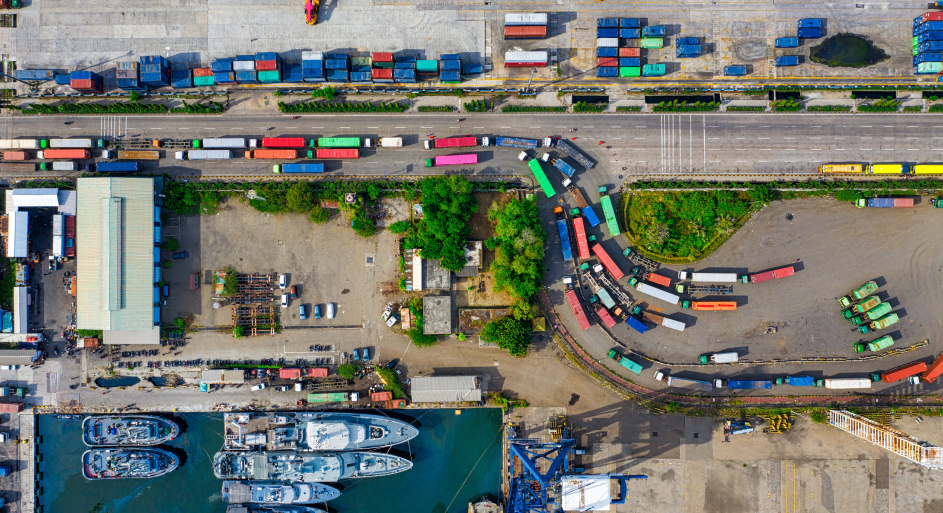
.png)
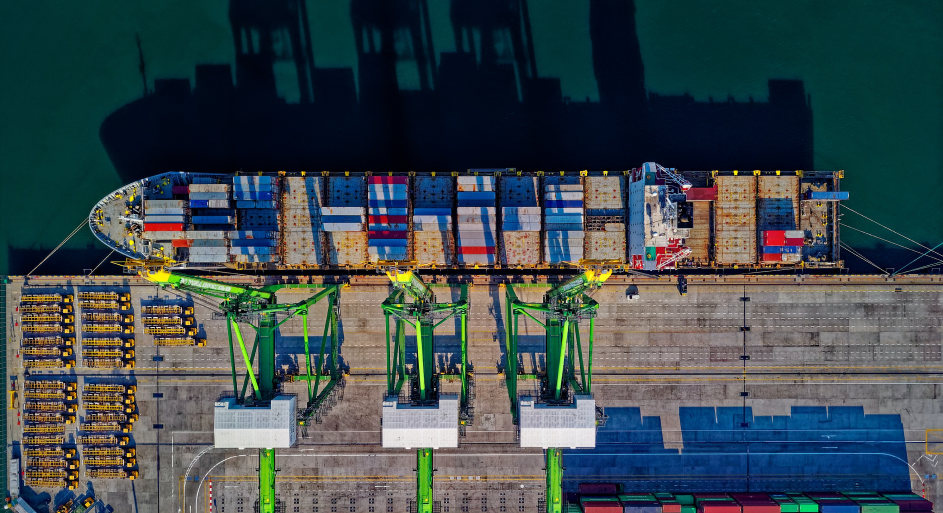
.png)
.jpeg)
.png)
